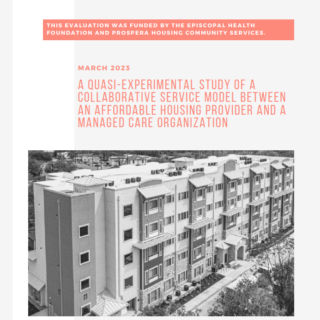Many managed care organizations (MCOs) are now focused on screening and addressing social determinants of health. Unique partnerships between MCOs with community providers are being explored, but there has been little formal evaluation of these partnerships. In this study, researchers evaluated a collaborative, community-based service model in which participants had health insurance coverage through Superior HealthPlan, the largest Medicaid MCO in Texas, and lived in properties maintained by Prospera Housing Community Services, an affordable housing provider. This Prospera+Superior collaborative model allowed for facilitated and joint programs aimed at improving social determinants of health, including access to nutritious foods, transportation, affordable health care and secure housing.
Using a quasi-experimental to group research design, researchers compared a sample of 104 participants served by the Prospera+Superior collaborative model to a demographically matched group of 104 participants who had healthcare coverage through the Superior HealthPlan Medicaid MCO but did not live at Prospera properties (i.e., Superior Only group).
The primary outcomes were healthcare utilization and cost. Researchers analyzed data from medical claims to examine change in outcomes from 12 months before implementation of the Prospera+Superior collaborative model in 2019 to 12 months after implementation.
Researchers conducted regression-based adjusted analyses which revealed the Prospera group had a 56% lower rate of emergency department/urgent care visits and spent $2,061 less than the Superior Only group after implementation.
Together these findings provide needed evidence of the clinical and economic value of forming multi sector collaborative models between NCOs and other community providers.
